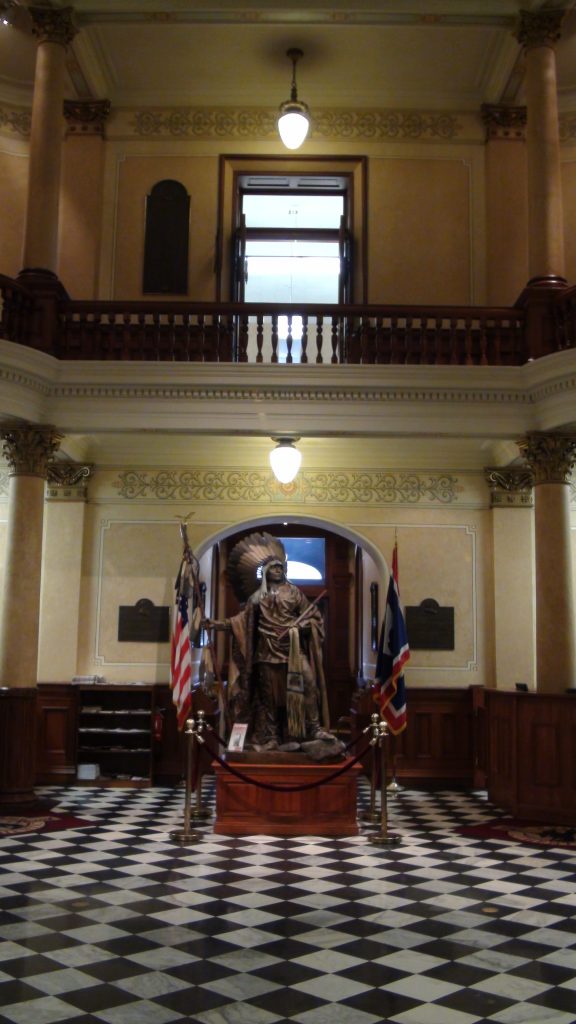Guv. Wyoming Capitol.
Friday, 17 May 2024
And as the sailors were seeking to escape from the ship, when they had let down the skiff into the sea, under pretense of putting out anchors from the prow, Acts 27:30
Note: You can listen to today’s commentary courtesy of our friends at “Bible in Ten” podcast. (Click Here to listen).
You can also read this commentary, scrolling with music, courtesy of our friends at “Discern the Bible” on YouTube. (Click Here to listen), or at Rumble (Click Here to listen).
More exactingly, it reads, “And the sailors, seeking to flee from the ship, and having let down the skiff into the sea, a pretext, as being about to extend anchors from the prow” (CG).
In the previous verse, the crew feared they would be dashed on rocks when they came to land, so they dropped four anchors from the stern, hoping for the day to come. Now, Luke continues with, “And the sailors, seeking to flee from the ship.”
Some translations add in the word “of,” and thus it is then translated, “And of the sailors.” This would then indicate that it wasn’t all of them that were doing this. Though not in the original, this is likely the case. Some of the sailors had a plan to abandon the ship, leaving the rest to fend for themselves. Therefore, it next says, “and having let down the skiff into the sea.”
In order to make it appear that they wanted to doubly secure the ship, these sailors let down a skiff, probably the same smaller boat that had been hauled in during verses 16 & 17. However, Luke notes this was “a pretext.”
They were working cunningly to save themselves, figuring it was safer to take a small ship that could be more easily maneuvered as shore approached. Their pretext was to let down this skiff, “pretending to extend anchors from the prow.”
Here is a new word, próra. It signifies the front of the ship, thus the bow or prow. It is derived from pro, to be in front of, which is where our modern prefix is derived from. One can see the logical movement from pro to próra, the prow.
The meaning of their action is that they were going to take anchors that were aboard the main ship and carry them out from the ship a distance before dropping them in. This would allow for a greater angle on the line in relation to the ship.
However, the true intent was to take the skiff and get away from the massive hull of the larger ship which could come apart violently. In the skiff, they would find a spot that was safe to drive up to the shore saving themselves.
Life application: The actions of the sailors are a normal response by anyone who has only this life to look forward to. Even many Christians cling unnecessarily to this life, sacrificing personal dignity and respect for others in the process. It is the stuff of movies, but that is so because it is the normal human condition to want to save oneself, even at the expense of others.
However, there is another unnatural human condition that is often highlighted in books and movies: the self-sacrificing hero. The marine jumps on a grenade to save his friends, the father gives up his life for his family, or – most incredibly of all – the Creator becomes the Redeemer by uniting with His creation, sending His Son into the world to save it from the consequences of sin.
Because of Jesus, an eternal hope is given to those who believe in Him. From there, the Christian can faithfully trust that this life is not all there is. With an eternal hope, we should consider this life of far less value, so that we dismiss the thought of betraying others to save ourselves for the sake of a temporary extension of our current walk in this fallen world.
Lord God, may we not be selfish or peevish in the face of troubles or disaster. Instead, may we faithfully trust that the events of this world cannot separate us from the promise of eternal life in Christ. Therefore, may our actions reflect this and be honorable before the eyes of all. To Your glory, we pray. Amen.





